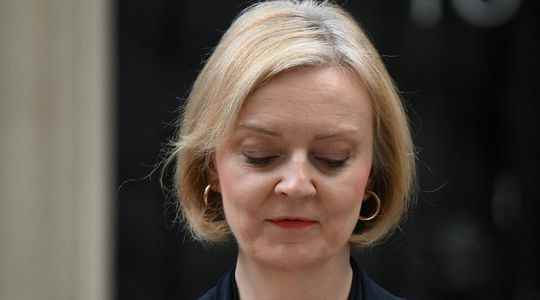And in the end, the lettuce won. Since Friday October 14, the British tabloid Daily Star broadcast a video in which we could see a portrait of the British Prime Minister, Liz Truss, posed next to a lettuce leaf. With a question in the subtitle: which of the two will reach its expiry date first?
This Thursday, October 20, the direct therefore abruptly stopped, Liz Truss having announced her resignation, only a month and a half after her installation at 10 Downing Street. She was dropped by two of her main ministers and forced to cancel almost all of her budgetary measures. His situation was becoming untenable according to Florence Faucher, director of the Center for European Studies and Comparative Politics at Sciences Po. Mined by divisions, the conservative party will now have to come to an agreement in order to find a successor to the ephemeral disciple of Margaret Thatcher.
L’Express: Did the resignation of Liz Truss become inevitable?
Florence Faucher : Yes, the news was expected. The resignations, within a week, of two of her most important ministers, namely Kwasi Karteng, Minister of Finance, and Suella Braverman, Minister of the Interior, left little doubt that Liz Truss could not continue to govern. The Conservative leader selection process tends to elect the most radical candidate, which happened in the case of Liz Truss. It is carried by a very strong ideological conviction which is confronted with the exercise of power.
In wanting to relaunch growth through debt-financed tax cuts, it terribly panicked financial markets. While the Conservative Party has distinguished itself for 150 years by its pragmatism which has allowed it to dominate the British political and parliamentary scene, Truss has remained locked into the economic vision of the ultra-liberals of the 1980s, whose principles are inapplicable today. today.
Is there a favorite to succeed him?
I see two profiles stand out. On the one hand, Rishi Sunak, the unsuccessful candidate against Liz Truss on September 5th. This former Minister of Finance is appreciated by Conservative MPs. Also, he opposed Liz Truss on the issue of tax cuts without clear funding, a subject that brought down the Prime Minister. On the other side, there is Peddy Mordount, in charge of relations between the government and the House of Commons. Her platform is more classic conservatism and she has campaigned for Brexit, which appeals to Boris Johnson’s loyalists. And, surprisingly, Johnson himself is not completely offside, at least to party adherents.
As the new Prime Minister will be appointed before October 28, I do not believe that we will go through a campaign, but rather that the Conservative MPs will agree on a single candidate to propose. We would then find the situation of 2016, when Theresa May was thus selected as Prime Minister. A compromise will therefore have to be found.
How to explain the chaos in which the conservative party finds itself?
Boris Johnson is largely responsible for the current chaos within the Tory party. He was elected on a promise to speed up the Brexit process, something Theresa May failed to do. In the snap elections of December 2019, he obtained a large majority, thanks in particular to the support of the ultra-liberal and Europhobic bloc. On the strength of this success and his promise to restore freedom to the United Kingdom, he expelled from the party the moderates, who happened to be experienced politicians. He broke with the tradition of governing with all currents of the party and chose relatives. He got a tough “Brexit” from which the party is suffering economically. He does not despair of returning and his supporters in the parliamentary group invoke the mandate he obtained in 2019 and hopes that his astonishing charisma will allow him to put the party, very weakened, back in working order for the legislative elections. Be that as it may, the next Prime Minister will have a very difficult task.
